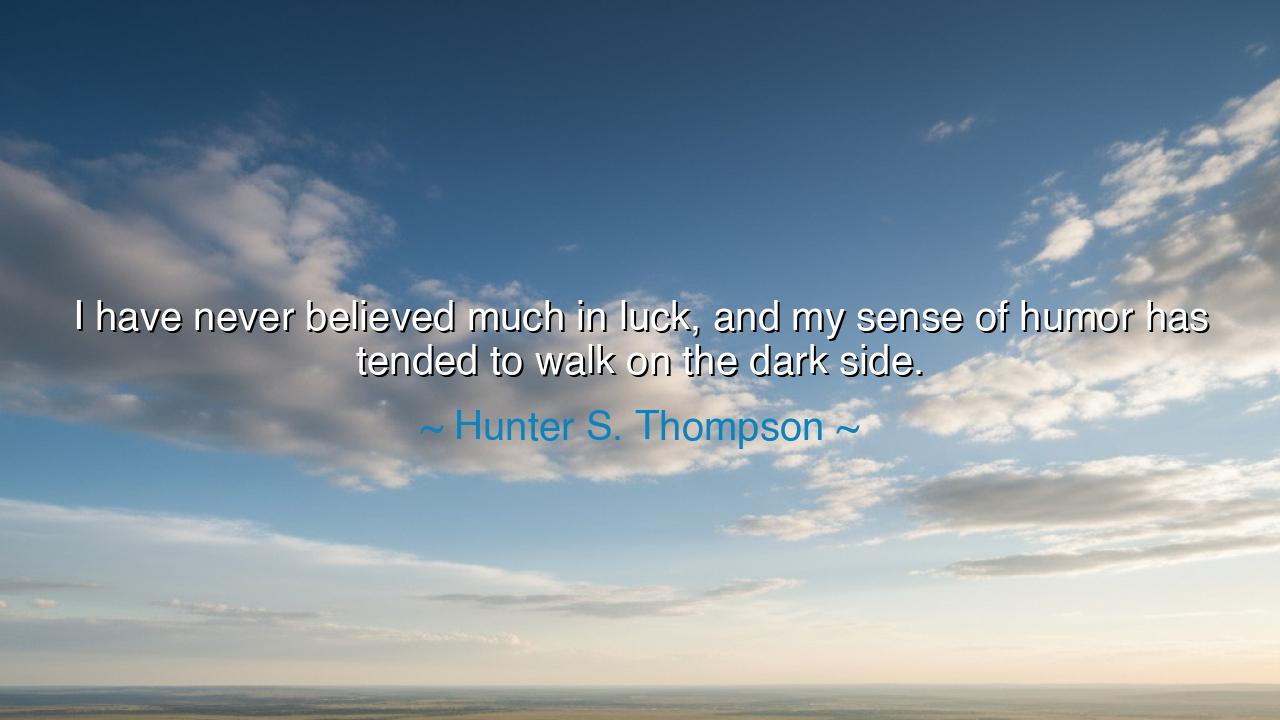
I have never believed much in luck, and my sense of humor has
I have never believed much in luck, and my sense of humor has tended to walk on the dark side.






When Hunter S. Thompson said, “I have never believed much in luck, and my sense of humor has tended to walk on the dark side,” he was revealing the philosophy of a man who faced the world unflinchingly, who refused to rely on chance and who found in humor a lantern to illuminate life’s shadows. His words speak of courage — not the courage of the untested, but the courage of one who has stared into chaos, suffering, and absurdity, and chosen to respond with insight and laughter. Humor, in Thompson’s hands, is a weapon and a shield, a guide through the dark corridors of human folly and despair.
The ancients, too, understood the power of walking in darkness while carrying light. Philosophers like Diogenes or writers like Lucian of Samosata often employed satire and irony, revealing the absurdities of human ambition, greed, and vice. Thompson’s dark humor is a modern echo of this tradition — the awareness that the world is both cruel and ridiculous, and that only by facing it directly, with laughter as your companion, can one survive without losing one’s mind. Humor, in this sense, is more than amusement; it is moral and philosophical armor.
Thompson’s rejection of luck — his declaration that he never believed much in it — is equally significant. To him, life is not a roll of the dice, but a series of choices and confrontations with reality. The dark side of humor, then, is not fatalism, but vigilance: a way of perceiving the world with clarity, seeing absurdity where others see only misfortune, and finding agency where others see only chance. It is the philosophy of those who accept life on its terms, armed with wit and awareness, rather than hope or superstition.
One historical example that mirrors Thompson’s insight is the life of Franz Kafka, whose works often embraced a macabre humor to illuminate the absurdity of bureaucratic and existential oppression. Kafka’s humor is dark, ironic, and piercing, yet it does not mock humanity for its own sake — it reveals the strange contradictions of life, showing that even in despair, one can observe and survive. Like Thompson, Kafka did not wait for luck; he faced the absurd with his intellect and his darkly keen sense of humor.
Thompson’s approach also reflects a profound psychological truth: humor that walks on the dark side allows one to confront fear, failure, and suffering without being consumed by them. By acknowledging the grotesque, the irrational, and the terrifying, and framing them with wit, the mind gains perspective. The laughter that emerges is not shallow or frivolous; it is a declaration of resilience. In Thompson’s words, dark humor is a conscious choice to face the depths without succumbing, to navigate chaos with clarity, and to recognize absurdity as both mirror and teacher.
Consider also the life of Winston Churchill, who faced the brink of national collapse and personal danger, yet often used humor to frame the gravest situations. His quips and sharp observations were tinged with darkness — irony, cynicism, and self-deprecation — yet they allowed him to endure pressures that would have crushed a lesser spirit. Thompson’s philosophy mirrors this: laughter does not erase hardship, but it allows one to meet it with equanimity, and sometimes even with defiance.
The lesson, then, is timeless: do not rely on luck, and do not fear the darkness. Cultivate a sense of humor that can navigate shadow and absurdity alike, that recognizes folly and cruelty, and yet chooses observation over despair. Dark humor, as Thompson demonstrates, is a tool of clarity and resilience — it allows one to see life fully, to endure, and to respond with both courage and insight. Laughter in shadow is a declaration of life, a refusal to be conquered by misfortune.
In practical terms, this means observing life honestly, acknowledging its absurdity and its pain, and finding humor within it — even when the laughter is bitter, ironic, or dark. Let it illuminate choices rather than obscure them, let it protect your spirit rather than attack others. As Hunter S. Thompson teaches, to walk on the dark side with humor is to navigate the world awake and alive, seeing clearly, laughing wisely, and living fiercely, without dependence on luck or illusion, but with the freedom that comes from awareness and wit.






AAdministratorAdministrator
Welcome, honored guests. Please leave a comment, we will respond soon